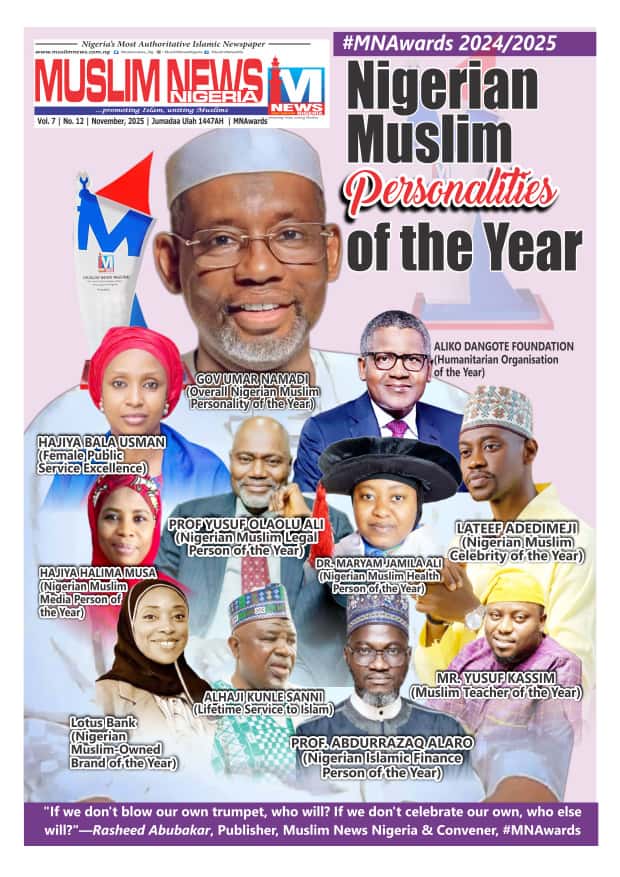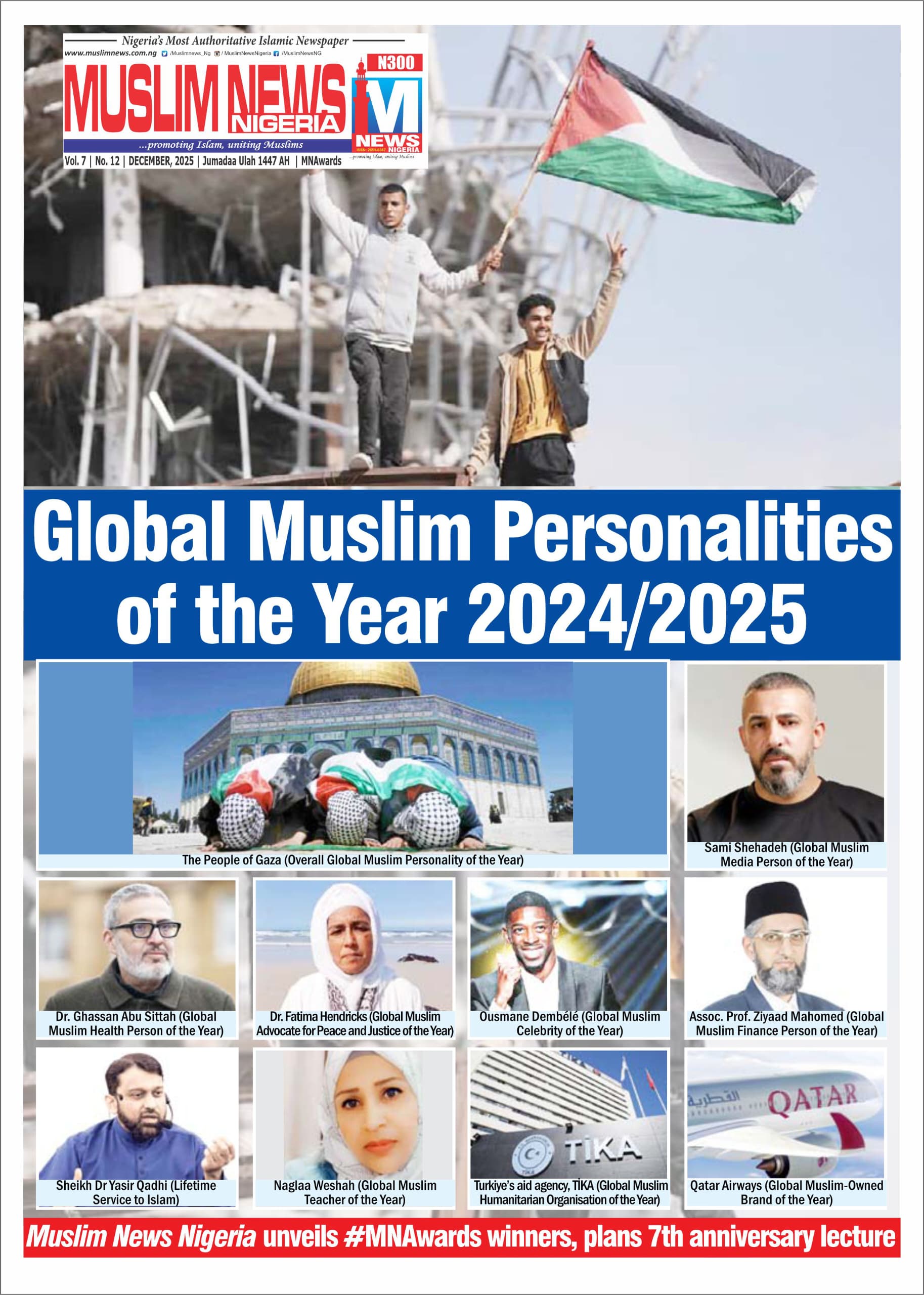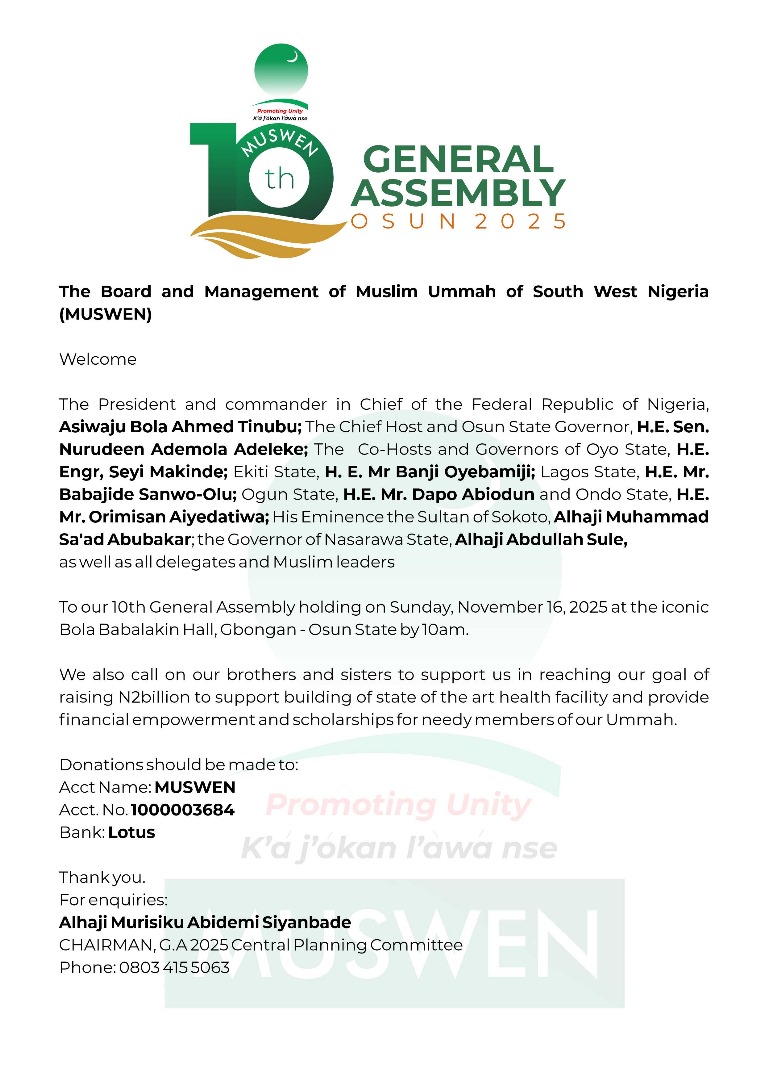Every year, the debate over the commencement and conclusion of Ramadan resurfaces, raising unnecessary tensions within Nigeria’s Muslim community.
The latest episode began on February 14, when the Robitatu-l-Aimmahwal Ulamoh fi Bilaadi Yoruba, known as Robitoh, issued a communique declaring that Ramadan 1446 AH (2025) would start on Saturday, March 1. Predictably, the announcement ignited controversy, particularly in the media, with claims that Yoruba Muslims had abandoned the Sultan of Sokoto’s traditional declaration.
However, it is important to note that the Muslim Ummah of South West Nigeria (MUSWEN) remains the recognized umbrella body for Muslims in the region and is affiliated with the Sultanate Council. Robitoh otherwise known as League of Imams and Alfas in Yorubaland is just one of several notable Islamic groups under MUSWEN leadership. Despite this, many Muslims voiced opposition to Robitoh’s declaration, arguing that Ramadan commencement should strictly follow actual moon sighting, as per Prophetic tradition.
In response to the concerns, some groups dismissed the fears of division, characterizing Robitoh’s announcement as an “academic exercise” rather than a challenge to the Sultan’s spiritual leadership. Yet, in a remarkable turn of events, the crescent moon was indeed sighted on March 1, aligning with the Sultan’s official proclamation. This raised questions about whether Robitoh had merely made an accurate prediction or had deliberately aligned with the Sultan’s eventual declaration.
As Ramadan progressed, another wave of controversy emerged. Sheikh Habeebullah Adam Al-Ilory, the Mudir of Markaz Centre for Arabic and Islamic Studies in Agege, reiterated his stance that Ramadan would end on Sunday, March 30, with Eid on Monday, March 31st. His assertion, “ọgbọ́n laa gba” (“we shall fast 30 days”), became a rallying cry among his supporters, further amplifying his influence and positioning him as a perceived rival to the Sultan’s authority.
This led to speculation that some groups were not merely engaging in intellectual discourse but were actively challenging traditional moon-sighting methods. The situation escalated when the Sultan, through the Nigerian Supreme Council for Islamic Affairs (NSCIA), instructed Muslims to look for the crescent of Shawwal on March 29. Meanwhile, Sheikh Habeebullah’s office separately announced that Eid would be observed on Monday, March 31, seemingly disregarding the possibility of a Shawwal moon sighting on March 29.
On March 29, NSCIA’s Secretary-General, Professor Is-haq Oloyede, stated, “It must be noted that, according to scientific calculations, the expected time for the conjunction of Shawwal moon in Nigeria is Saturday, 29th March 2025 at 11:58 a.m. That notwithstanding, as Islamic tradition stipulates, Muslims are enjoined to search for the crescent of Shawwal on the 29th of Ramadan.”
“If Muslims sight the crescent in accordance with the moon sighting and verification standards, then His Eminence would declare Sunday, 30th March 2025 as the 1st of Shawwal and the day of Eid-el-Fitr. However, if the crescent is not sighted that day, then Monday, 31st March 2025, automatically becomes the day of Eid-el-Fitr,” Oloyede stated.
Conversely, the statement from Markaz Agege, signed by its spokesperson, Nurudeen Ibrahim, claimed, “According to scientific knowledge, it is not possible for the new crescent to be seen in Nigeria or elsewhere on Saturday 29th of March, 2025. This is because the age of the new moon will be 6H 59M, making it practically impossible to sight it. For these reasons, Monday, 31st of March, 2025, will be the 1st of Shawwal.”
The controversy took another turn when major media outlets, including The Punch, Daily Times, Vanguard, and Daily Trust, rushed to publish reports suggesting that the Sultan had declared fasting would continue, even before official confirmation. These reports, later deleted without apology, misquoted Professor Oloyede and added to public confusion. A member of the National Moon Sighting Committee, Simwal, later refuted the claims, clarifying that the committee was still gathering reports when the misleading headlines were published.
There were suspicions that Sheikh Habeebullah’s group had influenced the media narrative, as their press release coincided with these erroneous reports. Alternatively, the media may have simply engaged in clickbait journalism, prioritizing traffic over accuracy.
Despite the confusion, the crescent moon was eventually sighted in multiple locations across Nigeria. Consequently, the Sultan officially declared Sunday, March 30, as Eid-el-Fitr. While most Nigerian Muslims, including President Bola Ahmed Tinubu and other government officials, observed Eid on Sunday, a smaller faction—including Sheikh Habeebullah’s followers—chose to celebrate on Monday. This decision caused disruption in some areas, such as Ogun State, where the Lantoro Central Eid Ground in Abeokuta was locked on Sunday due to conflicting directives from local religious leaders.
The Prophet Muhammad (SAW) explicitly prohibited fasting on the days of Eid, reinforcing the necessity of following established moon-sighting principles. The persistence of these yearly controversies is not just an academic exercise but a challenge to the unity of the Muslim Ummah. Such discord only serves to weaken the cohesion needed for Islamic progress and development in Nigeria.
The messy situation at the end of Ramadan could have been avoided if Robitoh had engaged in dialogue with the leadership of the Muslim Ummah. Despite being described by Professor Oloyede as a symbol of unity, Robitoh’s actions contributed to division rather than cohesion. The key question remains: Why do these disputes persist when all parties are part of the same Moon Sighting Committee? Addressing this issue privately through open and sincere discussions will help uphold the integrity of Islamic leadership in Nigeria.
Since the emergence of Sultan Abubakar Sa’ad III, efforts have been made to maintain uniformity in Ramadan’s observance. The need for unity within the Muslim community cannot be overstated. Leaders must engage in constructive dialogue to resolve lingering conflicts and ensure that religious traditions remain intact. Instead of public confrontations, collaborative efforts should be made to reinforce the credibility of moon sighting as the authentic method for determining Ramadan’s beginning and end. Only through unity and proper communication can the Muslim Ummah in Nigeria maintain harmony and uphold the sanctity of Islamic practices.
By Muslim News Nigeria Editorial Board. Email: muslimnewsng@gmail.com







